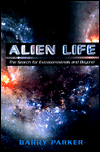Alien Life: The Search for Extraterrestrials and Beyond
Barry Parker
 Parker (physics and astronomy, Idaho State U.) surveys all the popular topics in the aliens craze, giving an overview of the subject and discussing the work of numerous scientists, science fiction writers, psychologists, and theorists. He discusses the development of life on our planet, the possibility of microbial life on Mars, life on other planets and moons in the solar system, life on planets outside of our solar system and what form their civilizations might take, SETI, UFOs, and our future exploration of the universe. Parker (physics and astronomy, Idaho State U.) surveys all the popular topics in the aliens craze, giving an overview of the subject and discussing the work of numerous scientists, science fiction writers, psychologists, and theorists. He discusses the development of life on our planet, the possibility of microbial life on Mars, life on other planets and moons in the solar system, life on planets outside of our solar system and what form their civilizations might take, SETI, UFOs, and our future exploration of the universe.
|
choose one of the following:
Further
information, reviews, & details
From the Publisher
Pointing up to the heavens, today's cutting-edge radio telescopes scan the cosmos for any signal that may indicate alien life, as tantalizing prospects lead us further along our quest. Already we may have found microbes in meteorites from Mars. As Parker points out, three of Jupiter's moons are now known to contain ice and liquid water - leading some scientists to believe that perhaps under this ice lie hidden areas teeming with aquatic life. After discovering planets outside our solar system, astronomers believe that other "suns" may exist capable of supporting planets that harbor alien life-forms. Beyond making contact, Parker stresses that disaster surely awaits us on Earth as its ever-growing population depletes our planet's natural resources. He delineates the plans to mine treasures in space, generate power on distant bodies, and establish thriving communities in space. We can control our alien searches in space, but what if they find us first? Have we already been visited? Have humanoid creatures with large black eyes actually hovered over our towns? How do we account for eyewitness reports of bizarre glowing lights, "scorched" patterns on crop fields, and alleged abductions? Parker investigates the truth surrounding these visits and discusses the UFO phenomenon.
From The Critics
Strange Magazine
Those who want a concise look at the possibilities of alien life will find this a good starting point; it is a useful “primer” for all ages.
Publisher's Weekly
Despite an evidently open-minded attitude, Parker delivers the hard line to ET enthusiasts in his new book: "strangely, we haven't found a single sign of life beyond our solar system." In his latest (following Chaos in the Cosmos and eight other books), the emeritus Idaho State University professor of astronomy and physics summarizes recent scientific conjecture on extraterrestrial life without venturing much personal speculation. He considers the "architecture of life" and the mystery of DNA as related to its possible exploitation elsewhere; the possibility of non-carbon-based life forms; the history of Mars exploration (including the recent "meteorite from Mars" discovery); the results of NASA space probes; the discovery of distant planets through advanced telescopy; and the SETI program's search for alien radio signals. Parker acknowledges the contentions of UFO believers, but devotes few pages to claims of alien encounters such as the well-known Roswell incident. Steering clear of that controversy as "an argument not likely to be resolved in the near future," Parker's hopeful and energetic book ends up reinforcing the science establishment's lonely outlook for humanity, but still leaves room for the possibility that if they are out there, we will find themor they, us. 79 illustrations. (May)
Booknews
Parker (physics and astronomy, Idaho State U.) surveys all the popular topics in the aliens craze, giving an overview of the subject and discussing the work of numerous scientists, science fiction writers, psychologists, and theorists. He discusses the development of life on our planet, the possibility of microbial life on Mars, life on other planets and moons in the solar system, life on planets outside of our solar system and what form their civilizations might take, SETI, UFOs, and our future exploration of the universe. Annotation c. by Book News, Inc., Portland, Or.
|
